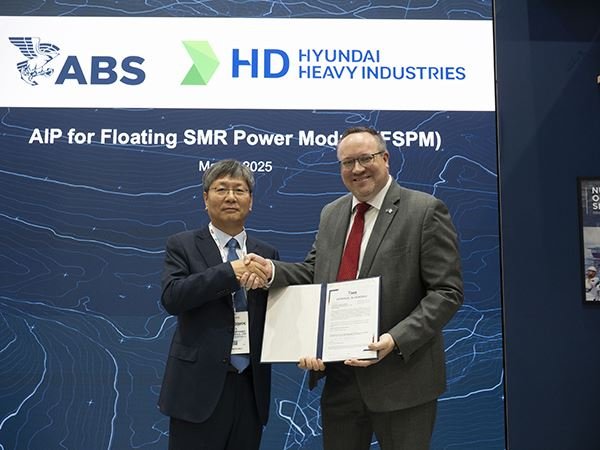ABS Grants Approval for Floating Small Modular Reactor Concept
Classification society American Bureau of Shipping (ABS) has issued approval in principle (AIP) to the affiliates of South Korean conglomerate HD Hyundai – HD Hyundai Heavy Industries (HHI) and HD Korea Shipbuilding & Offshore Engineering (HD KSOE) – for a concept of a floating small modular reactor (SMR) unit.
As disclosed, the design is intended to generate electricity offshore and near shore, supporting port facilities and onshore communities.
Patrick Ryan, Senior Vice President and Chief Technology Officer of ABS, commented: “Floating nuclear power facilities show promise in supporting power grids, microgrids, industrial and port operations, data centers, and other uses. Additionally, today’s advanced nuclear technology has a different risk profile from traditional reactor technology with state-of-the-art designs and with lower enrichment fuels, making commercial offshore and maritime applications more viable.”
An official from HD Korea Shipbuilding & Offshore Engineering stated: “The floating nuclear power plant is expected to play a key role in building a future powered by clean energy. We will remain fully committed to developing the necessary technologies and ensuring its successful realization.”
To note, this AIP is said to be the second for a floating nuclear power barge design from HD KSOE. Furthermore, it is reportedly the latest step in the company’s collaboration with ABS on nuclear technologies, including another power barge design and a 15,000 TEU nuclear-propelled containership.
Exploring New Frontiers in Nuclear Technology
In other news, ABS, in partnership with naval architecture specialist Herbert Engineering Corp (HEC), published a study on floating nuclear-powered data centers, detailing design considerations for such centers that support the rapid growth of artificial intelligence (AI), cloud computing, and cryptocurrencies.
Furthermore, the classification society released a report highlighting the potential of nuclear technology in the maritime industry through a study of a SMR on a standard liquefied natural gas (LNG) carrier.

